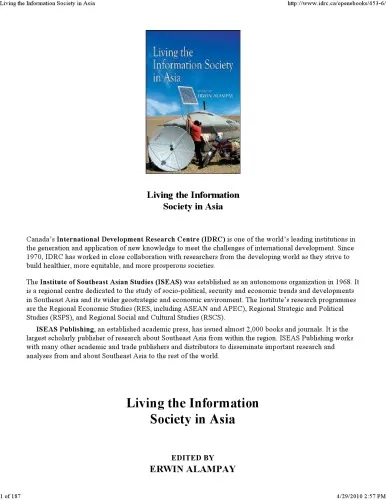Living the information society in Asia
4.0
Reviews from our users

You Can Ask your questions from this book's AI after Login
Each download or ask from book AI costs 2 points. To earn more free points, please visit the Points Guide Page and complete some valuable actions.Introduction to "Living the Information Society in Asia"
In the ever-evolving landscape of technology and societal transformation, "Living the Information Society in Asia" explores the profound impacts of the information society in a region that has emerged as a global hub for technological innovation, cultural diversity, and economic dynamism. This book is an in-depth study that examines how the rapid advancements in information and communication technologies (ICTs) are reshaping Asia's social fabric, governance, economic systems, and cultural identities.
The book aims to provide readers with a nuanced perspective on what it means to "live" within this digital ecosystem and how societies in Asia are uniquely adapting to these changes. As a comprehensive compilation of scholarly insights and everyday stories, it brings together critical discussions on policy, development, and their implications for inequality and inclusion in the digital age. This book is ideal for academics, policymakers, business leaders, and anyone intrigued by the intersection of digital technologies and human life in Asia.
Detailed Summary of the Book
The book begins with an overview of the information society and its conceptual framework, tailoring this to the Asian context. It highlights the region's diversity, not only in cultural dimensions but also in economic development, political systems, and digital readiness. Furthermore, it delves into the ways ICTs have permeated various aspects of life—from mobile connectivity to e-governance and education. Each chapter focuses on a significant theme, such as the digital divide, urban and rural disparities in technology access, and the role of cyberspace in shaping public discourse.
The narrative is weaved around key case studies from different Asian nations, offering a comparative perspective that allows readers to understand both commonalities and differences in the region's adaptation to information society dynamics. Topics such as digital literacy, privacy concerns, and the role of big data are thoroughly examined. This is not just a technical exploration; it also focuses on the social and ethical complexities of information technologies and how they affect common citizens. The book ultimately presents a balanced picture, acknowledging the promises of the information society while critically addressing its challenges.
Key Takeaways
- Asia is at the forefront of the global digital revolution, but the pace and scale of development vary across the region.
- ICTs have the potential to bridge socioeconomic gaps, yet they can also exacerbate inequalities if access and education are not prioritized.
- The role of governments, private sectors, and civil societies is crucial in shaping an inclusive and ethical information society.
- Technologies such as artificial intelligence, blockchain, and 5G present immense opportunities but also demand careful consideration regarding privacy and security.
- The human impact of technology must remain at the center of any discourse surrounding the information society, ensuring that societal well-being is prioritized over corporate or governmental interests.
Famous Quotes from the Book
"Living in an information society is not about merely surviving in a digital world but thriving within it, ensuring that no one is left behind."
"The success of the information society in Asia will be measured not only by its technological achievements but by how equitably its fruits are shared."
"The narratives of the information age must be told inclusively, capturing the voices of those who are often overlooked in the pursuit of progress."
Why This Book Matters
"Living the Information Society in Asia" is a critical work that underscores why the information society is more than just a theoretical construct; it is a lived reality with profound implications for millions of people. Asia, with its rapid technological adoption and diverse sociopolitical contexts, presents a unique case for understanding the global information society. This book matters because it not only identifies opportunities brought by ICTs but also unpacks the challenges that come with it, from privacy dilemmas to economic inequities.
As governments and organizations look to leverage the power of technology to drive economic growth and social development, this book provides a thoughtful roadmap on how these goals can be attained without compromising inclusivity or sustainability. Every reader will come away with a deeper appreciation of how technology is intertwined with humanity and the critical importance of ensuring that progress benefits the many, not the few.
Free Direct Download
Get Free Access to Download this and other Thousands of Books (Join Now)
For read this book you need PDF Reader Software like Foxit Reader


